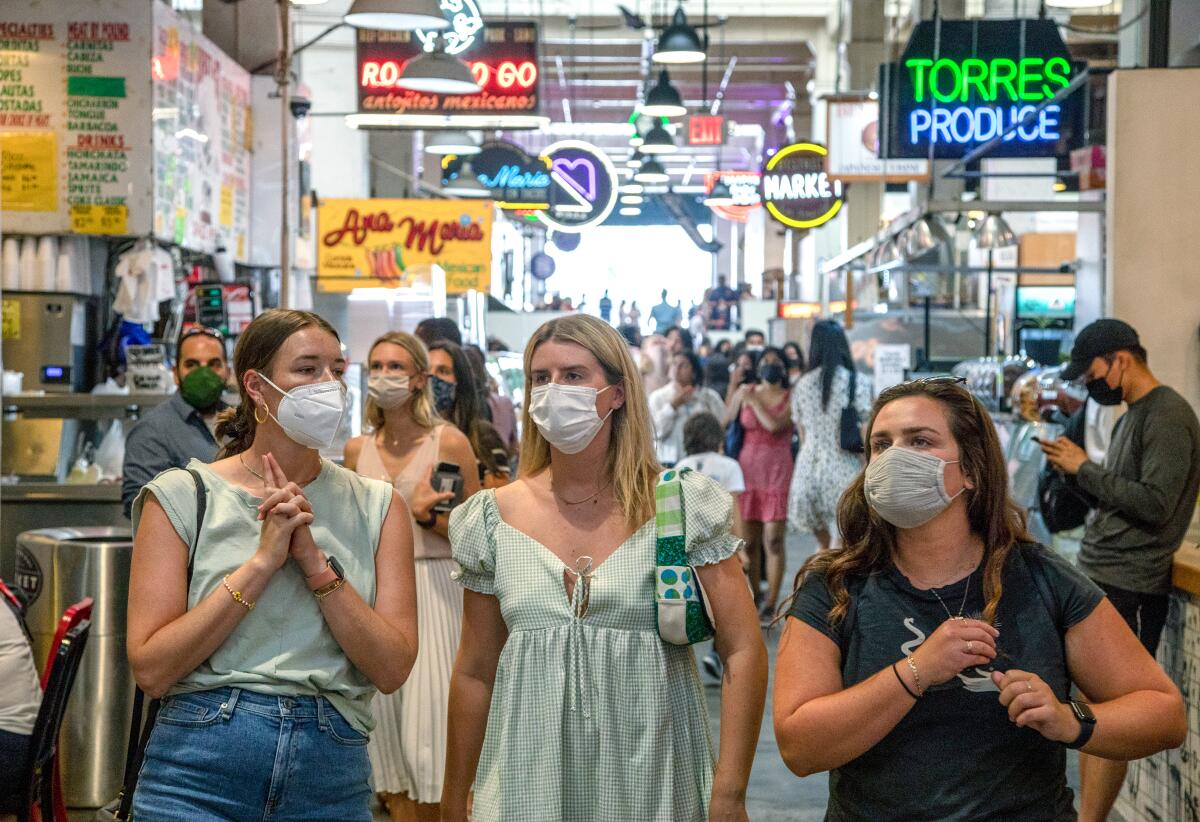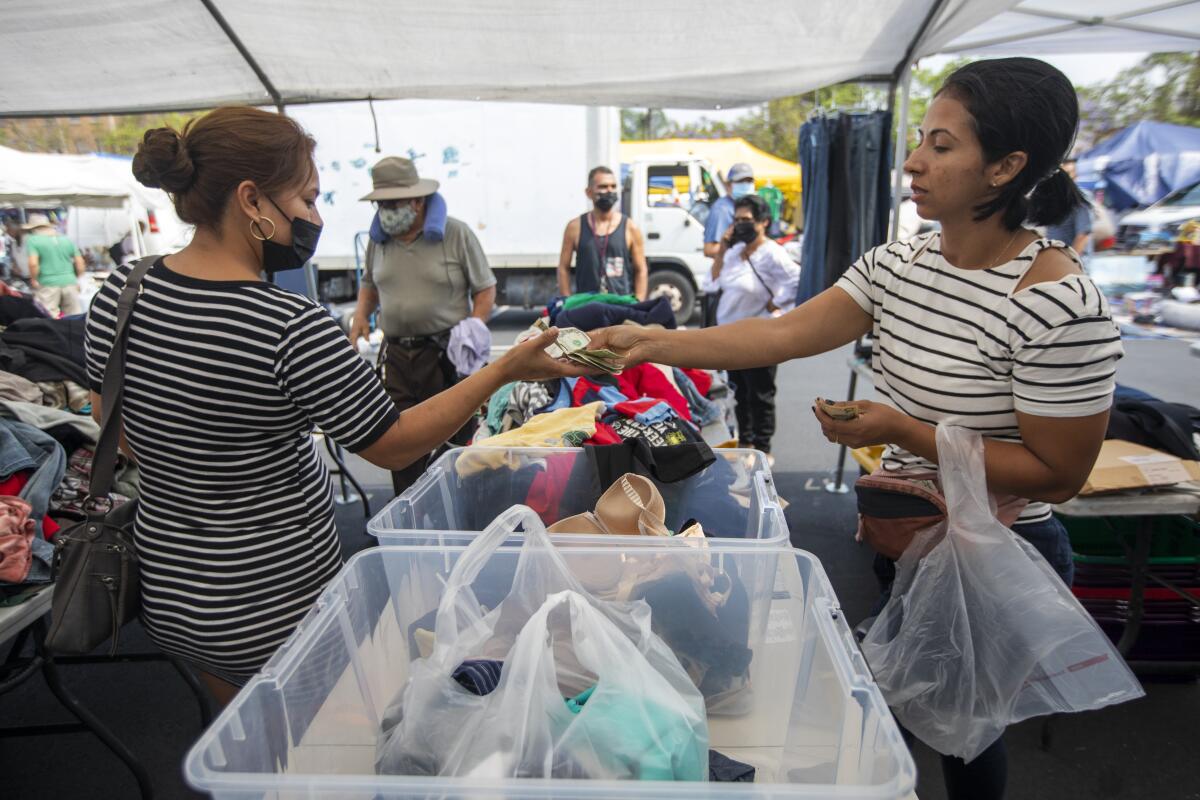Today’s Headlines: L.A. will consider requiring vaccine proof for indoor spaces

Here are the stories you shouldn’t miss today:
TOP STORIES
L.A. will consider requiring vaccine proof for indoor spaces
With coronavirus cases continuing to rise, Los Angeles is now considering a proposal to require proof of COVID-19 inoculation as a condition of entry at a host of indoor public spaces in what, if passed, would be the widest-ranging vaccination-verification effort in the city yet.
The motion, introduced by City Council President Nury Martinez and Councilman Mitch O’Farrell, would require eligible individuals to demonstrate that they’ve received at least one vaccination dose to visit indoor places such as restaurants, bars, retail stores, gyms, spas, movie theaters, stadiums and concert venues.
The move comes amid a spike in coronavirus cases fueled by the highly infectious Delta variant, which has both public officials and private businesses scrambling to slow the spread. Some L.A. restaurants have already begun requiring proof of vaccination for customers, saying they hope that action can forestall the more intense restrictions seen earlier in the pandemic that pushed some retailers to their breaking point.
A growing number of public agencies, private firms and universities are also imposing vaccination requirements, including all L.A. County employees. But the new proposal would expand the concept dramatically in L.A.
Start your day right
Sign up for Essential California for the L.A. Times biggest news, features and recommendations in your inbox six days a week.
You may occasionally receive promotional content from the Los Angeles Times.
More top coronavirus headlines
— The Biden administration is taking the first steps toward requiring nearly all foreign visitors to the U.S. to be vaccinated against COVID-19, a White House official says.
— The head of the World Health Organization is calling for a moratorium on administering booster shots of COVID-19 vaccines as a way to help ensure that doses are available in countries where few people have received their first shots.
— As L.A. is weighing options to require vaccinations, here are 20 restaurants and bars already implementing them.
For more, sign up for Coronavirus Today, a special edition of The Times’ Health and Science newsletter.
Forest Service changes ‘let it burn’ policy following criticism
Facing criticism over its practice of monitoring some fires rather than quickly snuffing them out, the U.S. Forest Service has told its firefighters to halt the policy this year to prioritize resources and help prevent small blazes from growing into uncontrollable conflagrations.
The change came days after California and western states politicians, including Gov. Gavin Newsom, publicly challenged the “let it burn” approach in the wake of the Tamarack fire, as The Times detailed in a story Sunday. It also comes as fierce winds are expected to collide with bone-dry conditions at the massive Dixie fire in Northern California, already California’s eighth largest in recorded history at more than 270,000 acres, leaving firefighters bracing for further spread during a red flag warning that goes through Thursday. Currently, the blaze is 35% contained, with nearly 5,000 personnel working to stop its advance.
Instead of letting some naturally caused small blazes burn, the agency’s priorities will shift this year, U.S. Forest Service Chief Randy Moore indicated to staff in a letter Monday. The focus, he said, will be on firefighters and public safety.
Moore, who took over as head of the agency last month, wrote that the 2021 fire season is “different from any before” and posed a “national crisis” that required the U.S. Forest Service to put on hold its mission to groom forestlands — at times by letting wildfire clear them — to make them more resilient to fires. Instead, he said, the agency will use its strained resources to protect lives and homes as more than 70 large fires burn across the United States, requiring more than 22,000 fire personnel to battle.
California’s climate nomads
With another fire season underway, the climate nomads of Butte County must hide or keep moving — scope out a little wooded draw to park a trailer unnoticed, head down the mountain to rotate between driveways in Chico, or bivouac in tents deep in the Cascade foothills.
The Camp fire displaced roughly 50,000 people in 2018, and many are still living in limbo, off the grid and out of compliance, as the nearby Dixie fire stirs up smoke and the past all over again.
The Camp fire most notoriously tore through the town of Paradise, but half the people who lost their homes were deeper in the woods, in poorer, more isolated places on the buttes, such as Concow, Jarbo Gap, Pulga and Yankee Hill. Many had no fire insurance. They often lived up dirt roads in houses that were built without proper permits. Some had no electricity or running water.
The disasters, fueled by drought and heat linked to climate change, effectively flushed backwoods people into a modern world of strict building codes and high costs they couldn’t afford.
Our daily news podcast
If you’re a fan of this newsletter, you’ll probably love our new daily podcast, “The Times,” hosted by columnist Gustavo Arellano, along with reporters from across our newsroom. Every weekday, it takes you beyond the headlines. Subscribe on Apple Podcasts and follow on Spotify.
FROM THE ARCHIVES
The Harvard and sister ship, Yale, were popular steamships serving San Francisco and Los Angeles in the 1920s. Built in 1907 at Chester, Pa., the Harvard was a 3,700-ton vessel that the U.S. Navy commandeered to transport troops during World War I.
On this date in 1921, the Harvard resumed passenger service with the Los Angeles Steamship Co. Nearly 10 years later, on May 30, 1931, it ran aground in heavy fog at Point Arguello. Though nearly 500 passengers escaped apparently unscathed, the ship was a total loss.

POLITICS
— Roughly two decades before she was elected to Congress, Rep. Cori Bush of Missouri lived in a Ford Explorer with her then-husband and two young children after the family had been evicted. For her, the fight to extend the federal eviction moratorium was personal.
— Gov. Gavin Newsom and his allies have raised more than $51 million to fight the attempt to recall him, more than twice as much as every major Republican candidate and pro-recall committee combined, according to new fundraising disclosure reports.
— The Supreme Court is viewed favorably by a majority of Americans, including equal numbers of Democrats and Republicans, according to a nationwide poll conducted last month by the Marquette University Law School.
Sign up early for our California Politics newsletter, coming in August, to get the best of The Times’ state politics reporting, including full coverage of the recall election and the latest action in Sacramento.
CALIFORNIA
— Hollywood-backed animal rescuer Marc Ching has pleaded no contest to practicing veterinary medicine without a license in a case brought after a Times investigation exposed disturbing practices at his pet store and charity.
— California water regulators took unprecedented action this week, passing an emergency regulation that will bar thousands of Californians from diverting stream and river water as the drought worsens.
— A Valley Village woman has sued the city of Los Angeles, saying she was struck by a car after venturing into a Hollywood street where a homeless encampment was blocking city sidewalks.
Support our journalism
Subscribe to the Los Angeles Times.
NATION-WORLD
— An overloaded van carrying about 25 passengers crashed on a remote south Texas highway, killing at least 10 people and injuring more than a dozen others, authorities said.
— As the world staggers through another summer of extreme weather, experts are noticing something different: 2021′s onslaught is hitting harder and in places that have been spared global warming’s wrath in the past.
— What alcohol ban? Booze is free-flowing in Tokyo during the Olympics, despite a pandemic prohibition.
— For 50 years, dozens of white, 157-foot-tall cylinders presided over Beirut’s port — landmarks in a city that had lost many of them. A year ago, the third-largest non-nuclear explosion in history turned the silos into monuments of despair.
HOLLYWOOD AND THE ARTS
— Hollywood’s strict safety protocols are being tested as the COVID-19 Delta variant rips through Los Angeles. Several TV and film productions have reported virus outbreaks and some have been forced to pause shoots, including Fox’s “The Masked Singer.”
— How do you build and sustain a career as a special-effects artist in the rapidly evolving entertainment industry? We asked experts for their advice.
— Streamer Acorn TV is an Anglophile favorite, but can it help AMC Networks compete with Netflix?
— Casting director David Rubin was reelected president of the Academy of Motion Picture Arts and Sciences by the organization’s board of governors, the academy announced.
BUSINESS
— YouTube Theater, a 6,000-seat arena next to SoFi Stadium in Hollywood Park, opens this month, marking the internet video giant’s further expansion into live events.
— A time bomb has been ticking at Oakland-based Kaiser Permanente — an accumulation of allegations that the giant health plan systematically defrauded Medicare. But it’s not just Kaiser: the indications are that Medicare Advantage is profoundly infected with fraud, writes columnist Michael Hiltzik.
SPORTS
— The U.S. men’s water polo team is in a position to improve on its 10th-place finish at the Rio Olympics, but the team still isn’t where it wants to be.
— Lawyers for Dodgers pitcher Trevor Bauer on Tuesday attempted to counter a woman’s accusation that Bauer sexually assaulted her by releasing text messages the woman exchanged with Bauer and others. But the messages also discuss the injuries the woman said she received at Bauer’s hand.
Get the latest news from Tokyo with our Olympics live blog and the Sports Report newsletter.
Free online games
Get our free daily crossword puzzle, sudoku, word search and arcade games in our new game center at latimes.com/games.
OPINION
— It certainly feels like a reach to call the planned Obama party an outrageous superspreader event when tens of thousands of people are cramming into music festivals such as Lollapalooza. But then, the organizers of music festivals aren’t the folks who advocated stay-home orders, bans on gatherings and mask mandates, writes Jon Healey.
— The United Teachers Los Angeles leadership is poised to vote on a resolution to support the boycott movement against Israel. It’s the wrong hill for California educators, writes The Times’ editorial board.
WHAT OUR EDITORS ARE READING
— Rihanna is now worth $1.7 billion, Forbes estimates—making her the wealthiest female musician in the world and second only to Oprah Winfrey as the richest female entertainer. But it’s not her music that’s made her so wealthy. (Forbes)
— A Massachusetts couple ran a website about e-commerce and found themselves the target of a bizarre harassment campaign directed by senior executives at eBay. They’re finally telling their side of the story. (Boston Globe)
— Emotional tears are uniquely human — no other species cries when it’s sad. There is remarkably little consensus about its purpose. (Vice)
ONLY IN L.A.
The Los Angeles City College swap meet, which was on the verge of shutting down after pandemic-related losses, will remain open as new management takes over.
For more than two decades, the weekend swap meet has taken place at a parking lot on the community college campus in East Hollywood. It provides crucial business for vendors and revenue for student scholarships, and affordable shopping for low-income residents. This past Sunday was expected to be its last day. But LACC Swap, a company started by L.A. events producer Philip Dane, is taking over the swap meet.

Today’s newsletter was curated by Daric L. Cottingham and Laura Blasey. Comments or ideas? Email us at [email protected].
Sign up for Essential California
The most important California stories and recommendations in your inbox every morning.
You may occasionally receive promotional content from the Los Angeles Times.




